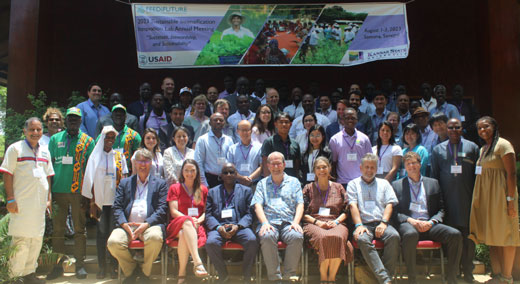October 4, 2023
Sustainable Intensification Innovation Lab hosts 2023 annual meeting in Senegal

The Feed the Future Lab on Collaborative Research for Sustainable Intensification, or SIIL, at Kansas State University hosted its 2023 annual meeting from Aug. 1-3 in Somone, Senegal. There were about 80 participants in attendance, including research and university partners and funding recipients of the SIIL, and a representative from the United States Agency for International Development, or USAID.
In addition, there was leadership from K-State, private sector entities, agricultural extension, the Peace Corps and other partners as well as the SIIL External Advisory Board. Participants included individuals from 11 countries across the globe.
Grant Chapman, associate provost for international programs, provided welcome remarks as he expressed gratitude to USAID and the SIIL for their commitment to making positive impacts on productivity, sustainability, environment and being a leader in pursuing, welcoming and supporting our international scholars.
David Rosowsky, vice president for research, praised SIIL for its dedication to supporting the K-State mission of remaining a global research leader as a land-grant university.
"SIIL exemplifies our university's commitment to research, teaching, extension, and capacity-building programs," Rosowsky said. "Additionally, the SIIL supports our land-grant mission to develop and deliver innovations that benefit the lives and livelihoods of people in our state, nation, and around the world."
Ernie Minton, Eldon Gideon dean of the College of Agriculture and director of K-State Research and Extension, shared the importance of the impacts of SIIL's tangible contributions and developments made globally.
"As the SIIL shares solutions and outcomes through the impact of your work, it is felt around the world," Minton said. "There has never been a greater need for the collaborative, innovative work you do through SIIL."
Promotional videos and presentations were provided for each of SIIL's current projects, consortiums and initiatives highlighting their research on sustainable agricultural innovations followed by a Q&A session. This provided time for engagement and multidisciplinary collaboration between the various projects and consortia. After research updates were given, conference participants engaged in guided facilitation workshops based on topics that included digital and precision agriculture, the future of sustainable intensification and more. During these sessions, participants were divided into five groups, which provided the opportunity for cross-cultural collaboration and interaction. This activity was led and facilitated by Jules Pretty, SIIL External Advisory Board chair.
Additionally, the last day of the meeting included traveling to visit the Agricultural Technology Park in Thies, Senegal. The park showcased the current seed varieties, innovations in agronomy, agricultural mechanization and geospatial technologies being used in that region of Africa to help combat food insecurity and climate change. After visiting the Agricultural Technology Park, meeting participants toured the Center of Excellence for Improving Adaptation to Drought, Centre d'Etude pour l'Amélioration de l'Adaptation à la Sécheresse, facility where the work from the Agricultural Technology Park is analyzed. After the tour, SIIL-sponsored students who were in attendance at the meeting had the opportunity to present their research posters from their studies. The last event of the meeting included an interactive session involving the partners, scholars and students of the SIIL, where individuals were able to present the work and impact that is being done throughout our focus countries in the agricultural sector.
Vara Prasad, university distinguished professor, R.O. Kruse endowed professor and director of the SIIL, highlighted the collaboration and commitment of all partners across the globe.
"Through our continued partnership with institutions and individuals around the world, the SIIL has been able to successfully maintain our lab's mission in identifying innovations and developing technologies that benefit smallholder farmers," Prasad said. "The collaboration and commitment of various organizations in many different countries has been SIIL's greatest strength which has led to an increased institutional, human and social capital, with emphasis on positive impact on the people and communities in the host countries."
Comments from USAID partners included appreciation for the breadth and depth of the SIIL portfolio, the positive engagement through the meeting and the dedicated work to find innovative ways to combat global food, nutritional and climate security.
View all presentations, highlight videos and photos from the annual meeting. For news and updates, sign up for the SIIL newsletter by emailing siil@k-state.edu.
